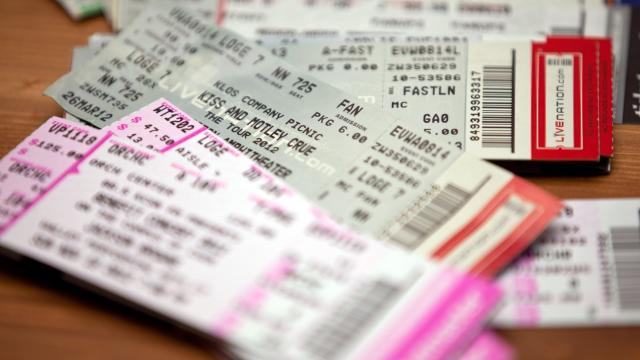Beware of the Latest Concert Ticket Scams: Tips to Stay Safe
- by Adam Bailey
- in Latest

In a recent report by Lloyds Bank, Taylor Swift fans in the UK lost an estimated £1 million ahead of her Eras tour last month. From Lloyds alone this equated to an average loss of £332 per person among the 600 customers who reported the scam.
However, this is just one case among many in the UK, and scammers are operating in various countries around the world. Moreover, it's not just Taylor Swift fans who are targeted; scammers are also focusing on fans of other high-profile artists. Therefore, it's essential to remain vigilant when purchasing tickets for any band or performer.
As one of the most popular artists today, Billie Eilish concert go-ers could also be a prime target for scammers. She recently announced an extensive 81-date world tour, titled the 'Hit Me Hard and Soft Tour,' spanning Europe, Australia, and North America. Tickets for the tour will go on sale starting May 3rd. The tour is scheduled to kick off in Canada on September 29th, followed by shows in the US in October, Australia in February, and Europe in April.
Scammers are continually evolving their tactics to exploit unsuspecting fans. Here are some of their latest tricks and warnings to watch out for:
Experts at QR Code Generator have highlighted the common scams to be aware of when purchasing tickets and offer top tips for buying and reselling tickets safely, ensuring fans get to enjoy their shows without being taken advantage of.
Marc Porcar, CEO of QR Code Generator says:
“As Eilish is one of the biggest stars of the 21st century, it’s expected that ticket scalpers and scammers will increase their efforts to take advantage of vulnerable fans who are desperate to go – so it’s essential that you proceed with caution when purchasing tickets.”
Be Cautious of Printed Ticket Awareness and Speculative Ticketing:
Beware of sellers posting tickets they don’t actually have or using counterfeit printed tickets. Most tickets, especially for large events, have a barcode or QR code. Avoid ticket listings that display a photo of the ticket with a barcode or QR code, as it could be a duplication.
Beware of Below Market Value Prices:
Watch out for prices that seem too good to be true. While they may appear as bargains, they could be a red flag for a scam. Scammers often use these low prices to lure fans in and steal their payment information during the transaction.
Watch Out for False Error Messages:
This common scam involves scammers creating convincing error messages after the initial payment. These messages may prompt customers to re-enter their bank information or hold them on a fake loading screen while fraudsters steal their information.
Be Wary of Unexpected Communications:
Scammers may send fake text messages or emails that appear convincing, especially since many official ticket sellers have mailing lists for fans. Be cautious of unsolicited messages from fake sellers, especially if they request personal details.
Avoid Seat Scams:
Fraudsters may sell tickets for seats they haven't secured, leading buyers to receive a different seat than the one they ordered. The scammer then uses some of the money to purchase a cheaper seat.
Urgency or Pressure Tactics:
Scammers often create a false sense of urgency to push potential buyers into hasty decisions regarding fake tickets, especially for sold-out events. Watch out for phrases like "Tickets running out!" or "Exclusive deal for a limited time only!" Always verify the source and check venue announcements.
Avoid Suspicious Payment Measures:
Some scammers may ask for specific payment methods such as gift cards or bank transfers via a "card machine." Avoid providing card details over the phone, as scammers may record voices for identity fraud and voice phishing.
As well as identifying the scams to look out for, the experts also offer safety tips when purchasing and reselling tickets to avoid any disappointment.
QR Code Generator’s Marc Porcar says: “Always purchase tickets from official sources. There are many lookalike websites which can be easily mistaken, particularly in the initial ticket presale or general sale rush. Checking for security indicators such as ‘https://’ and double-checking the URL is key.
“A lot of verified ticket sellers have presales with certain offers such as preordering albums, being part of something like O2 Priority. If fans want the upper hand, it may be worth looking into for an extra aid.
“Never share personal information outside of official ticket purchase platforms. Avoid taking screenshots or photos of any sensitive information such as card number, address, first and last name, sign-in information – scammers can transfer the ticket to themselves and steal your ticket – two-factor authentication is worth getting
“Also be wary when purchasing tickets over social media. Fans must be cautious of social media profiles with no photos, friends, or suspicious names or usernames. Fraudsters are known for making new accounts just to scam fans and then deleting the page afterward, so it’s best to avoid interacting with suspicious accounts online.
“Finally, it may be a gamble, but resellers tend to drop their ticket prices on the day of the performance. For sold-out events, this may be the best option for those who missed out on the initial general sale yet are still hoping to secure some tickets!”
or post as a guest
Be the first to comment.


